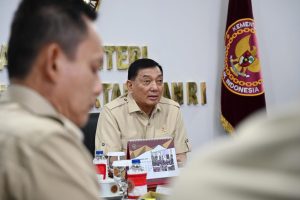On October 22, a longstanding tradition at Indonesia’s Ministry of Defense took on new significance as President Prabowo Subianto handed the role of defense minister over to Sjafrie Sjamsoeddin, a seasoned military leader and former colleague. The event was further elevated by the attendance of many prominent retired senior military officers, creating an atmosphere of camaraderie and optimism.
The gathering of these senior officers symbolized collective support for the direction in which Sjafrie is likely to take Indonesia’s defense policy – a direction aligned with Prabowo’s vision of modernizing the Indonesian Armed Forces (TNI) in response to both domestic and regional security demands.
Sjafrie’s experience in defense policymaking extends beyond his military career, also including his tenure as secretary-general of the Ministry of Defense (2004-2009) and later as deputy minister under Purnomo Yusgiantoro (2010-2014). This period marked Indonesia’s efforts to rebuild its defense posture through the “Minimum Essential Forces” initiative – a long-term plan to strengthen defense capabilities and the domestic defense industry. It also marked a strategic shift in the country’s defense policy, from its previous focus on the domestic political realm to greater attention on regional and geopolitical dynamics, recognizing the military’s key role in global interactions.
During this period, Sjafrie played a key role in refining defense procurement procedures that involved adjusting the balance of decision-making power between the ministry and the military branches. Additionally, his legacy includes the establishment of the Defense Industry Policy Committee, which aims to harmonize military procurement with the development of Indonesia’s defense industry, including policies on offsets and technology transfers.
This background is crucial as Sjafrie steps into his new role, inheriting a legacy of strategic policy development. His appointment also coincides with a renewed focus on enhancing Indonesia’s defense capabilities, particularly in response to regional pressures like South China Sea tensions and the AUKUS pact, which heighten the need for a stable power balance between the U.S. and China.
Beyond Procurement
Indonesia’s greater role in geopolitical stage requires a strong defense posture, and Sjafrie will play a key role in advancing Prabowo’s vision.
Therefore, it is essential that increased defense budgets translate not only into upgraded capabilities but also address internal challenges. Conversations with military officials and defense policy experts underscore several pressing challenges that need attention. Furthermore, force sustainment often lacks sufficient funding especially for maintenance, leading to decreased operational readiness for some critical systems.
Currently, defense procurement heavily favors foreign manufacturers, relegating the domestic defense industry, including state-owned enterprises under the Defend ID holding company, to a supporting role for offset and technology transfer requirements. While modernization often necessitates foreign procurement, Sjafrie must ensure that these acquisitions bring meaningful benefits to the local industry through comprehensive offset agreements and technology transfers, fostering a self-sufficient and resilient defense industry.
Sjafrie’s familiarity with these companies’ structural issues will be essential as he will need to lay out a sustainable defense procurement plan that will not only help state-owned defense companies such as PTDI, PAL, Pindad, LEN, and Dahana survive but also thrive. This will likely require balancing the expected quick outcomes in terms of defense capabilities with the more longer-term impact on the domestic defense industry.
Structural reform
Structural reform within the Indonesian Armed Forces (TNI) is another critical challenge – one that is often overlooked. With his strong political backing, Sjafrie is in a position to chart the future structure and size of the TNI, a proposal that past administrations have been reluctant to address due to its political sensitivity.
The TNI, currently comprising 404,500 personnel, faces structural inefficiencies that Sjafrie will need to address. Over the years, the TNI has seen a growing number of high-ranking officers – often assigned to civilian roles – that has expanded its size without necessarily adding to its operational capacity.
Defense analysts suggest that a leaner force could allow TNI to concentrate resources on training, equipment, and strategic readiness, creating a more agile and capable defense force. A former TNI Chief once suggested that 150,000 would be the ideal size for the Indonesian Army, which currently employs twice that number. Although opinions may vary on the exact figure, there is broad consensus on the need for a well-equipped, well-trained, and adequately compensated force – a goal that remains prohibitively expensive at its current size.
Budget constraints, however, are an ever-present reality. While Prabowo is committed to defense, his strong emphasis on large-scale social programs means that defense budgets will remain tight, especially considering Indonesia’s economic realities in the uncertain global climate. In this context, Sjafrie is expected to craft strategic policies that focus on building Indonesia’s deterrence capabilities in critical areas and address the most pressing problems in order to maximize the impact of available resources.
Another significant challenge for Sjafrie is gaining acceptance among civil society organizations, given his extensive military background, which includes deployments in conflict zones like the former East Timor and Aceh, as well as his involvement in Jakarta during the bloody unrest of 1998 as Indonesia transitioned to democracy. While history cannot be undone, Sjafrie would do well to follow in the footsteps of his former mentor, Juwono Sudarsono, who earned respect as a defense minister open to human rights issues and committed to reforming the security sector.
In summary, as Sjafrie assumes his new role, he has the expertise and backing to make transformative changes. However, he faces considerable challenges in navigating budget constraints, a complex procurement process, and the balancing act between modernizing the military and supporting Indonesia’s defense industry. His job will not be easy, but if he chooses to embrace reforms that take Indonesia beyond the status quo, I am willing to give Sjafrie the benefit of the doubt.

































